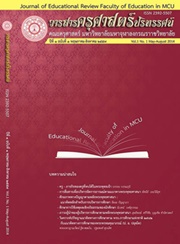Seven Sappurisa Dhammas:The Integrative Concept for Sustainable Education Quality Development
Main Article Content
Abstract
Educational management in all levels and all forms must be for the development of human resources and country to keep up and comply with the changes in the globalization with economic, social and environmental change which caused an imbalance between economic development on the natural environment and cultural diversity. The prosperity and sustainability of the country require educational management to sustainable quality. So the quality of education is veryimportant. Students must be planted with the conscious of Thainess, discipline, responsibility, public-mind, responsibility to society and environment, recognizing as a member of the world, being a good civic, understanding of current situations and self-developing to be able to live in this world happily. This is a creative driving-force in social and national development. In educational management for developing population quality, Seven Sappurisa Dhammas, which are the virtues of a good man, should be integrated with educational management to support and develop sustainable quality of education and improve the population's quality of life. They can live a happy life and make society and nation progress and prosperous.
Article Details
ทัศนะและความคิดเห็นที่ปรากฏในบทความในวารสารฉบับนี้ถือเป็นความรับผิดชอบของผู้เขียนบทความนั้นเพียงผู้เดียว และไม่ถือเป็นทัศนะและความรับผิดชอบของกองบรรณาธิการ
กองบรรณาธิการขอสงวนสิทธิ์ในการคัดเลือกบทความลงตีพิมพ์และจะแจ้งให้เจ้าของบทความทราบหลังจากผู้ประเมินบทความตรวจอ่านบทความแล้ว
ต้นฉบับที่ได้รับการตีพิมพ์ในวารสารครุศาสตร์ปริทรรศน์ คณะครุศาสตร์ มหาวิทยาลัยมหาจุฬาลงกรณราชวิทยาลัย ถือเป็นกรรมสิทธิ์ของคณะครุศาสตร์ มหาวิทยาลัยมหาจุฬาลงกรณราชวิทยาลัย ห้ามนำข้อความทั้งหมดหรือบางส่วนไปพิมพ์ซ้ำ เว้นเสียแต่ว่าจะได้รับอนุญาตจากมหาวิทยาลัยฯ เป็นลายลักษณ์อักษร


